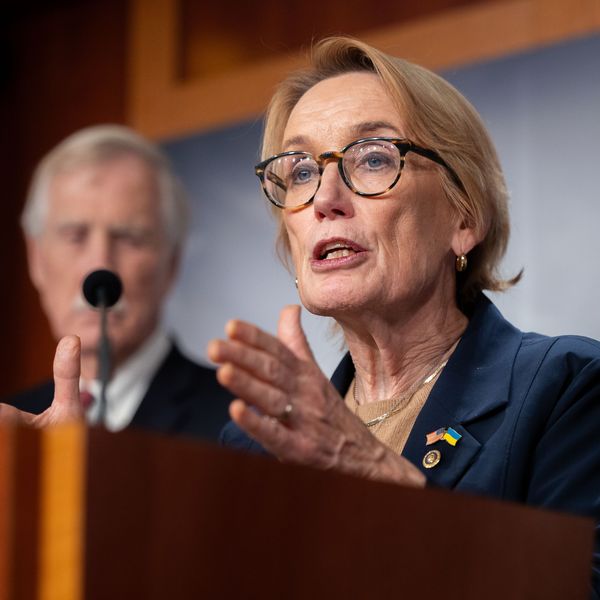
J.D. Vance shakes hands with former President Donald Trump during a rally on April 23, 2022 in Delaware, Ohio. (Photo: Drew Angerer/Getty Images)
JD Vance, Backed by Trump and Billionaire Cash, Wins GOP Senate Primary in Ohio
"Vance is an out-of-touch millionaire who's made a career of bashing the working class and is the worst possible choice to represent Ohio," said Rep. Tim Ryan, who will face off against Vance in November.
J.D. Vance, a venture capitalist who garnered national acclaim with his book Hillbilly Elegy, won the Republican U.S. Senate primary in Ohio on Tuesday, riding an endorsement from former President Donald Trump and a large infusion of campaign cash from billionaire Peter Thiel.
Having decisively beaten Republican rival Josh Mandel, a fervent Trump loyalist who vied unsuccessfully for the former president's backing, Vance will face off against Rep. Tim Ryan (D-Ohio) in November, a key race in the fight for control of the closely divided Senate.
"He rose to fame on a tale of white culture in crisis and moved further rightward along with the rest of the GOP after Trump gave them permission."
"Vance is an out-of-touch millionaire who's made a career of bashing the working class and is the worst possible choice to represent Ohio," Ryan tweeted late Tuesday after handily winning the Democratic Senate primary over progressive candidate Morgan Harper. "We're currently beating him in the polls and need your help to widen the gap."
Before launching his political career, Vance--who was often portrayed by corporate media outlets as an authority on Appalachian life and the white working class more broadly--pilloried Trump as "cultural heroin" and warned that he was "leading the white working class to a very dark place."
But Vance has since changed his tune, hailing Trump as "the best president of my lifetime" and putting to work what critics have denounced as overtly "fascist rhetoric" to advance his political career in an increasingly authoritarian GOP.
"We are in a late republican period," Vance told Vanity Fair, remarks that went to press days after Trump endorsed his Senate campaign last month. "If we're going to push back against it, we're going to have to get pretty wild, and pretty far out there, and go in directions that a lot of conservatives right now are uncomfortable with."
In his victory speech late Tuesday, Vance painted himself as the "voice" of "people who are caught between the corrupt political class of the left and the right," comments reminiscent of Trump's acceptance speech at the 2016 Republican National Convention.
"They need a representative," Vance continued, neglecting--for obvious reasons--to mention that his campaign was bolstered by $15 million in donations from Thiel, a co-founder of PayPal.
Speaking at a rally in Nebraska over the weekend, Trump confused Vance with his rival Mandel, declaring: "We've endorsed--J.P., right? J.D. Mandel, and he's doing great. They're all doing good. They're all doing good. And let's see what happens."
New York magazine's Sarah Jones, who has tracked Vance's rise since the publication of Hillbilly Elegy, argued in a recent column that "Vance and Trump always had more in common than the author's long-ago public statements implied."
"The proof is in Hillbilly Elegy, a fundamentally conservative, even reactionary work. At a high-school job, Vance writes, he learned 'how people game the welfare system,'" Jones noted. "Customers would 'buy two-dozen packs of soda with food stamps and then sell them at a discount for cash,' he asserts."
Such passages, wrote Jones, "should have raised the alarm for any reader who is interested in lifting Americans out of poverty."
"Scratch lightly at the surface of Hillbilly Elegy and right-wing themes become apparent," Jones continued. "Vance's characterizations of the poor only repackaged myths about welfare queens and the terminal laziness of the disadvantaged. But since Vance branded himself as a graduate of the working-class Appalachian experience, liberals graded his commentary on a sliding scale."
"He rose to fame on a tale of white culture in crisis and moved further rightward along with the rest of the GOP after Trump gave them permission to do so," Jones added. "Trump has now rewarded him for his dedication. If that shocks liberals, they can ask themselves what they once found so compelling about Vance and Hillbilly Elegy. J.D. Vance is who he's always been. The signs were present from the start."
Days ahead of the Ohio primary contests, The American Prospect's Robert Kuttner slammed Vance as a "fake populist" and wrote that "Democrats nationally have a shot at defeating Trumpism and incipient fascism only if they succeed in refocusing debate on the downward slide that is behind so much of the voter anger, and demanding bold measures to reverse it."
"That will not be accomplished by private equity guys wielding cultural hates," Kuttner wrote.
An Urgent Message From Our Co-Founder
Dear Common Dreams reader, The U.S. is on a fast track to authoritarianism like nothing I've ever seen. Meanwhile, corporate news outlets are utterly capitulating to Trump, twisting their coverage to avoid drawing his ire while lining up to stuff cash in his pockets. That's why I believe that Common Dreams is doing the best and most consequential reporting that we've ever done. Our small but mighty team is a progressive reporting powerhouse, covering the news every day that the corporate media never will. Our mission has always been simple: To inform. To inspire. And to ignite change for the common good. Now here's the key piece that I want all our readers to understand: None of this would be possible without your financial support. That's not just some fundraising cliche. It's the absolute and literal truth. We don't accept corporate advertising and never will. We don't have a paywall because we don't think people should be blocked from critical news based on their ability to pay. Everything we do is funded by the donations of readers like you. Will you donate now to help power the nonprofit, independent reporting of Common Dreams? Thank you for being a vital member of our community. Together, we can keep independent journalism alive when it’s needed most. - Craig Brown, Co-founder |
J.D. Vance, a venture capitalist who garnered national acclaim with his book Hillbilly Elegy, won the Republican U.S. Senate primary in Ohio on Tuesday, riding an endorsement from former President Donald Trump and a large infusion of campaign cash from billionaire Peter Thiel.
Having decisively beaten Republican rival Josh Mandel, a fervent Trump loyalist who vied unsuccessfully for the former president's backing, Vance will face off against Rep. Tim Ryan (D-Ohio) in November, a key race in the fight for control of the closely divided Senate.
"He rose to fame on a tale of white culture in crisis and moved further rightward along with the rest of the GOP after Trump gave them permission."
"Vance is an out-of-touch millionaire who's made a career of bashing the working class and is the worst possible choice to represent Ohio," Ryan tweeted late Tuesday after handily winning the Democratic Senate primary over progressive candidate Morgan Harper. "We're currently beating him in the polls and need your help to widen the gap."
Before launching his political career, Vance--who was often portrayed by corporate media outlets as an authority on Appalachian life and the white working class more broadly--pilloried Trump as "cultural heroin" and warned that he was "leading the white working class to a very dark place."
But Vance has since changed his tune, hailing Trump as "the best president of my lifetime" and putting to work what critics have denounced as overtly "fascist rhetoric" to advance his political career in an increasingly authoritarian GOP.
"We are in a late republican period," Vance told Vanity Fair, remarks that went to press days after Trump endorsed his Senate campaign last month. "If we're going to push back against it, we're going to have to get pretty wild, and pretty far out there, and go in directions that a lot of conservatives right now are uncomfortable with."
In his victory speech late Tuesday, Vance painted himself as the "voice" of "people who are caught between the corrupt political class of the left and the right," comments reminiscent of Trump's acceptance speech at the 2016 Republican National Convention.
"They need a representative," Vance continued, neglecting--for obvious reasons--to mention that his campaign was bolstered by $15 million in donations from Thiel, a co-founder of PayPal.
Speaking at a rally in Nebraska over the weekend, Trump confused Vance with his rival Mandel, declaring: "We've endorsed--J.P., right? J.D. Mandel, and he's doing great. They're all doing good. They're all doing good. And let's see what happens."
New York magazine's Sarah Jones, who has tracked Vance's rise since the publication of Hillbilly Elegy, argued in a recent column that "Vance and Trump always had more in common than the author's long-ago public statements implied."
"The proof is in Hillbilly Elegy, a fundamentally conservative, even reactionary work. At a high-school job, Vance writes, he learned 'how people game the welfare system,'" Jones noted. "Customers would 'buy two-dozen packs of soda with food stamps and then sell them at a discount for cash,' he asserts."
Such passages, wrote Jones, "should have raised the alarm for any reader who is interested in lifting Americans out of poverty."
"Scratch lightly at the surface of Hillbilly Elegy and right-wing themes become apparent," Jones continued. "Vance's characterizations of the poor only repackaged myths about welfare queens and the terminal laziness of the disadvantaged. But since Vance branded himself as a graduate of the working-class Appalachian experience, liberals graded his commentary on a sliding scale."
"He rose to fame on a tale of white culture in crisis and moved further rightward along with the rest of the GOP after Trump gave them permission to do so," Jones added. "Trump has now rewarded him for his dedication. If that shocks liberals, they can ask themselves what they once found so compelling about Vance and Hillbilly Elegy. J.D. Vance is who he's always been. The signs were present from the start."
Days ahead of the Ohio primary contests, The American Prospect's Robert Kuttner slammed Vance as a "fake populist" and wrote that "Democrats nationally have a shot at defeating Trumpism and incipient fascism only if they succeed in refocusing debate on the downward slide that is behind so much of the voter anger, and demanding bold measures to reverse it."
"That will not be accomplished by private equity guys wielding cultural hates," Kuttner wrote.
- Trump Taps JD Vance—Who Once Called Him 'America's Hitler'—as Running Mate | Common Dreams ›
- Climate Movement Sounds Alarm on Trump Picking 'Big Oil Sellout' JD Vance for VP | Common Dreams ›
- Trump's Pick of Vance Shows GOP 'Will Stop at Nothing to Ban All Abortion' in US | Common Dreams ›
- Working-Class Climate Protesters Arrested at JD Vance's Senate Office | Common Dreams ›
- Opinion | Trump and Vance Are the Enemy of Working People | Common Dreams ›
- Union Firefighters Greet JD Vance With Boos After 'Most Pro-Worker' Claim | Common Dreams ›
J.D. Vance, a venture capitalist who garnered national acclaim with his book Hillbilly Elegy, won the Republican U.S. Senate primary in Ohio on Tuesday, riding an endorsement from former President Donald Trump and a large infusion of campaign cash from billionaire Peter Thiel.
Having decisively beaten Republican rival Josh Mandel, a fervent Trump loyalist who vied unsuccessfully for the former president's backing, Vance will face off against Rep. Tim Ryan (D-Ohio) in November, a key race in the fight for control of the closely divided Senate.
"He rose to fame on a tale of white culture in crisis and moved further rightward along with the rest of the GOP after Trump gave them permission."
"Vance is an out-of-touch millionaire who's made a career of bashing the working class and is the worst possible choice to represent Ohio," Ryan tweeted late Tuesday after handily winning the Democratic Senate primary over progressive candidate Morgan Harper. "We're currently beating him in the polls and need your help to widen the gap."
Before launching his political career, Vance--who was often portrayed by corporate media outlets as an authority on Appalachian life and the white working class more broadly--pilloried Trump as "cultural heroin" and warned that he was "leading the white working class to a very dark place."
But Vance has since changed his tune, hailing Trump as "the best president of my lifetime" and putting to work what critics have denounced as overtly "fascist rhetoric" to advance his political career in an increasingly authoritarian GOP.
"We are in a late republican period," Vance told Vanity Fair, remarks that went to press days after Trump endorsed his Senate campaign last month. "If we're going to push back against it, we're going to have to get pretty wild, and pretty far out there, and go in directions that a lot of conservatives right now are uncomfortable with."
In his victory speech late Tuesday, Vance painted himself as the "voice" of "people who are caught between the corrupt political class of the left and the right," comments reminiscent of Trump's acceptance speech at the 2016 Republican National Convention.
"They need a representative," Vance continued, neglecting--for obvious reasons--to mention that his campaign was bolstered by $15 million in donations from Thiel, a co-founder of PayPal.
Speaking at a rally in Nebraska over the weekend, Trump confused Vance with his rival Mandel, declaring: "We've endorsed--J.P., right? J.D. Mandel, and he's doing great. They're all doing good. They're all doing good. And let's see what happens."
New York magazine's Sarah Jones, who has tracked Vance's rise since the publication of Hillbilly Elegy, argued in a recent column that "Vance and Trump always had more in common than the author's long-ago public statements implied."
"The proof is in Hillbilly Elegy, a fundamentally conservative, even reactionary work. At a high-school job, Vance writes, he learned 'how people game the welfare system,'" Jones noted. "Customers would 'buy two-dozen packs of soda with food stamps and then sell them at a discount for cash,' he asserts."
Such passages, wrote Jones, "should have raised the alarm for any reader who is interested in lifting Americans out of poverty."
"Scratch lightly at the surface of Hillbilly Elegy and right-wing themes become apparent," Jones continued. "Vance's characterizations of the poor only repackaged myths about welfare queens and the terminal laziness of the disadvantaged. But since Vance branded himself as a graduate of the working-class Appalachian experience, liberals graded his commentary on a sliding scale."
"He rose to fame on a tale of white culture in crisis and moved further rightward along with the rest of the GOP after Trump gave them permission to do so," Jones added. "Trump has now rewarded him for his dedication. If that shocks liberals, they can ask themselves what they once found so compelling about Vance and Hillbilly Elegy. J.D. Vance is who he's always been. The signs were present from the start."
Days ahead of the Ohio primary contests, The American Prospect's Robert Kuttner slammed Vance as a "fake populist" and wrote that "Democrats nationally have a shot at defeating Trumpism and incipient fascism only if they succeed in refocusing debate on the downward slide that is behind so much of the voter anger, and demanding bold measures to reverse it."
"That will not be accomplished by private equity guys wielding cultural hates," Kuttner wrote.
- Trump Taps JD Vance—Who Once Called Him 'America's Hitler'—as Running Mate | Common Dreams ›
- Climate Movement Sounds Alarm on Trump Picking 'Big Oil Sellout' JD Vance for VP | Common Dreams ›
- Trump's Pick of Vance Shows GOP 'Will Stop at Nothing to Ban All Abortion' in US | Common Dreams ›
- Working-Class Climate Protesters Arrested at JD Vance's Senate Office | Common Dreams ›
- Opinion | Trump and Vance Are the Enemy of Working People | Common Dreams ›
- Union Firefighters Greet JD Vance With Boos After 'Most Pro-Worker' Claim | Common Dreams ›

